2022 Congress Preparations
July 16, 2021 in Announcements, Conference, Conference Announcement, Ibero-Medieval Association of North America, IMANA, International Congress on Medieval Studies, Kalamazoo, Societas Magica
Call for Papers (CFP) for Sessions
Sponsored or Co-Sponsored by the RGME
at the 57th International Congress on Medieval Studies (Online)
Monday, May 9, through Saturday, May 14, 2022
CFP Deadline: 15 September 2021
[Deadline for Session Programs: 1 October 2021]
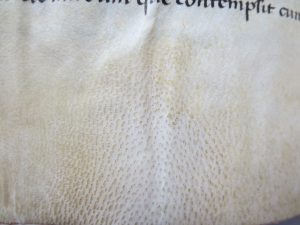
Private Collection, Le Parc Abbey, Theological Volume, Part B: Detail of Vellum Leaf. Photography Mildred Budny.
[Update on 22 September 2021:
Following the close of the CFP on 15 September, we can welcome the received proposals for papers, observe their strength and range, and prepare the programs for each session. With the selection of proposed papers accomplished, it comes time to arrange their sequence within the given Sessions, assign the Presiders for them, and submit the programs to the Congress Committee by 1 October 2021.
When appropriate, we can announce the Programs, report the assignment of their scheduling within the Congress Program overall, and publish the Abstracts of the Papers and Responses, as the authors might be willing. The Congress Program will become available in due course, and registration for the online Congress might commence.
Update on 1 October 2021:
At the close of the deadline for submission of the programs to the Congress, we report that each of our Sessions has three or four Papers; three sessions also have Responses; and we plan to hold a Business Meeting at the Congress, as in previous years. All these activities are to take place online.]
[Posted on 15 July 2021]
After accomplishing the 2021 ICMS Online, with 5 Sponsored and Co-Sponsored Sessions, plus our Open Business Meeting, we produced the 2021 Congress Report, as we turned to preparations for the 2022 Congress. We proposed Sessions, and received answers in stages.
Through the Confex system for the 2022 International Congress on Medieval Studies, we have learned that all but one of our proposed sessions have been accepted.
One of the accepted sessions resumes a series (“Medieval Writing Materials”) which a rejection for the 2015 Congress disrupted. That rejection interfered with the momentum of our series of sessions on the subject at the 2011–2016 Congresses. (See Sponsored Sessions.) The interval between then and now is a long time to wait. We had to turn to other subjects, as the momentum for their own action not only gathered to produce the proposals to sponsor or co-sponsor them, but also found favor by the Congress Committee, so that it could become possible to move to the phase of the Call for Papers for them. With the Pre-Congress Business Meeting in May 2021, as we prepared for this year’s Congress, we aimed to resume that series, as well as to explore other sessions as their subjects and proponents might direct.
So, we can resume the series on Medieval Writing Materials for 2022. But a new rejection of another subject for the Congress leads us to reconsider our approach to its current momentum. This time, learning from experience, we could choose what to do, but elsewhere, before long, with the subject not accepted this time around, rather than waiting for some other year — or decade — at the Congress.
And so, now, we announce the Call for Papers for the 2022 Congress.
2022 Sessions Sponsored and Co-Sponsored
For the 2022 Congress we plan four Sessions. Two are co-sponsored. One is co-sponsored with the Societas Magica, in Year 18 of our organizations’ co-sponsorship of Sessions at the Congress. One is co-sponsored with the Ibero-Medieval Association of North America (IMANA), in Year 1 of a new tradition. (See our Co-Sponsored Sessions.)
One Session resumes a series of Sessions sponsored by the RGME at the Congress: “Medieval Writing Materials”.
1–2. Sponsored by the Research Group on Manuscript Evidence
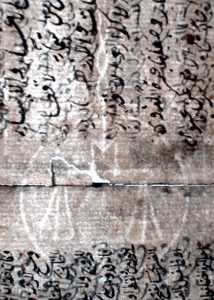
Private Collection, Turkish Binding Fragment with Balance Watermark.
1. Medieval Writing Materials: Processes, Products, and Case Studies
Contact: Mildred Budny
director@manuscriptevidence.org
Organized by Mildred Budny
Seeking to explore new and cumulative research on medieval writing materials and their impact, we propose to examine multiple modes for producing books, documents, and texts in other forms, such as wax, wood, metal, or stone. Case-studies might consider, for example,
- the transmission of paper across geographical regions and cultures
— whether as material structures (watermarks sometimes included) or as products (books, correspondence, and more) - the deployment of multi-media in assembling various products (bindings, reused fragments, seals, etc.)
- the roles of the technology and praxis of manuscripts in shaping the initial production of incunables, on both paper and vellum.
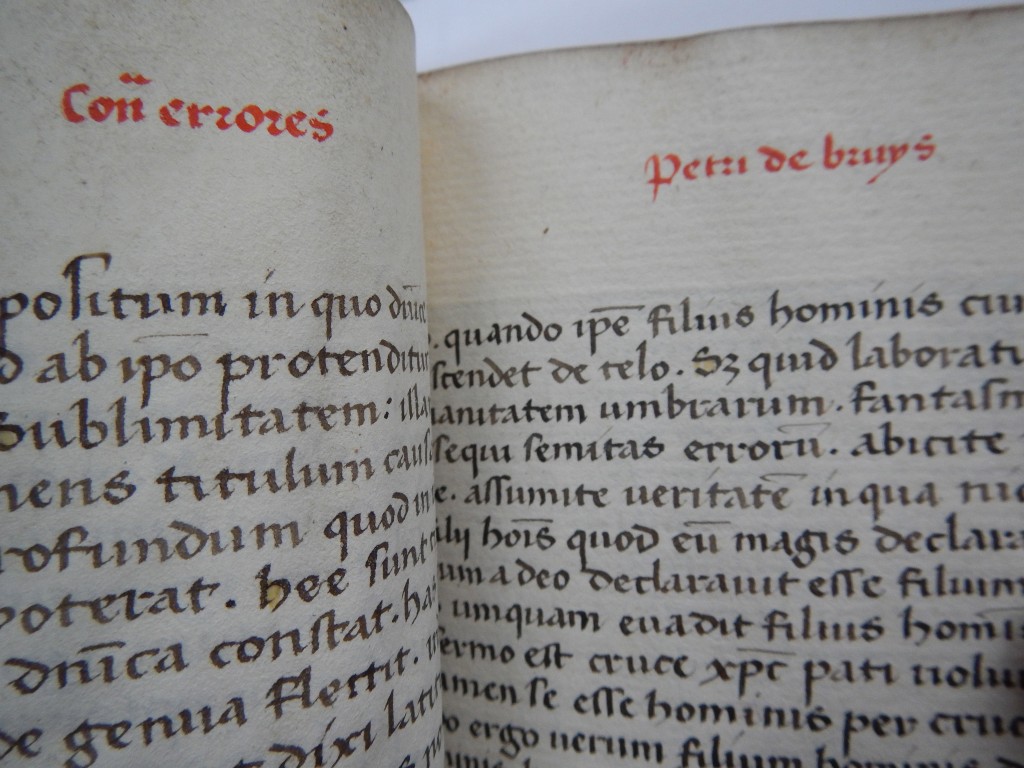
Vellum faces Paper in the Le Parc Abbey copy of Peter the Venerable. Photography Mildred Budny.
2. Pressing Politics:
Interactions between Authors and Printers in the Fifteenth and Sixteenth Centuries
Contact: Mildred Budny
director@manuscriptevidence.org
Organized by David Porreca
The symbiotic relationship between authors and printers was as fraught in the early days of printing as it is today. Indeed, the level of care that authors invested in their works was not always matched by diligence on the part of those charged with the physical layout of the text and is mechanical reproduction. Yet for every example of such tensions and the errors at their source (e.g., Marsilio Ficino), there is another of extremely productive collaboration on both sides (e.g., Desiderius Erasmus and Aldus Manutius). This session proposes to examine the full range of these interactions, including layout and illustrations.

Colored Illustration of Marsilio Ficino Teaching, in M. Ficinus, “Medicinarius: Das Buch der Gesundheit” (Strasbourg : J. Grueninger, 1509). Image via Wikimedia Commons; source https://catalogue.bnf.fr/ark:/12148/cb41910792s.
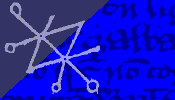
Societas Magica logo
3. Co-Sponsored with the Societas Magica
3. The Iconography of Medieval Magic:
Texts and Images
[Co-sponsored with Societas Magica]

The Newberry Library, Vault Case MS 5017, Book of Magical Charms, Image 17. Instructions “To Speak with Spirits”, with seals.
Contact: Vajra Regan
vajra.regan@mail.utoronto.ca
Organized by Vajra Regan
Medieval magical texts describe innumerable images, many of which occur in medieval art. Illustrations in media, from engraved gems and manuscript illuminations to monumental sculpture, testify to the wide diffusion of magical motifs. For example, Michael Camille has shown that the images in a book of ritual magic (the Ars Notaria) appear in a fourteenth-century cassone panel, while archaeologists have confirmed that the jasper ring of Archbishop Hubert Walter (died 1205) depicts the figure of Chnoubis.
This session will gather papers from diverse disciplines, so as better to understand the relationship between images and texts in the rich transmission of magical iconography in the Middle Ages.
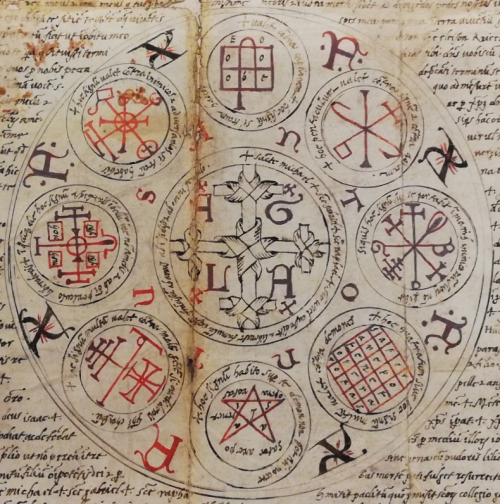
© The British Library Board. Additional MS 15505, folio 22r. Italian, early 16th century. Circular diagram with coloured drawings of nine magical seals, as a textual amulet with charms against diseases, made for a man named Francesco, in a mixture of Christian iconography, seals, and the ‘Sator Arepo’ formula.
4. Co-Sponsored with the Ibero-Medieval Association of North America (IMANA)
Alter(n)ative Alphabets in the Iberian Middle Ages
[Co-sponsored with IMANA]
Contact: Donald W. Wood
Organized by Donald W. Wood
This panel encourages the study of marginalized or non-canonical linguistic and textual objects. This aim aligns with the missions of both IMANA and the RGME to increase cross-disciplinary analysis of Iberian cultural production, representing a multiplicity of voices, material evidence, innovative methodologies, and diverse cross-disciplinary perspectives. The texts examined can engage with minority or niche hybrid-linguistic structures pertaining to Medieval Iberia’s minority religious and cultural entities, congruent with our concerted and collective desire to weave a richer tapestry of racial, cultural, religious, and ethnic inclusion.
This panel will explore uses of niche or alternative alphabets in the Iberian Middle Ages, conceived broadly as the period spanning the 8th through 17th centuries. Within this framework, the term ‘Iberian’ may also extend to Iberian-controlled territories outside of the Iberian Peninsula. Papers may address Judeo-Spanish, Haketia, Judeo-Arabic, Mozarabic, Aljamiado, or other linguistic blendings that have yet to be explored in scholarly fashion. Possible themes may include the implications of an alphabetic choice for the resulting textual object — manuscripts, glosses, inscriptions, epigraphs, and other forms of written expression — or examples of alterity beyond the text to achieve a particular end.
We hope to include a wide range of participants embracing senior scholars, graduate students, scholars with institutional affiliation, and independent scholars, American and international, as is customary for our organizations, at the Congress and elsewhere. In accordance with our organizations’ statements:
IMANA encompasses cross-disciplinary study of any form of cultural production from all communities and polities of the Iberian Peninsula, from every century of the Middle Ages (broadly conceived), and is very interested in comparative panels. In keeping with the desire of IMANA to represent multiple voices, innovative methodologies, and diverse perspectives, we especially encourage multi-authored collaborative submissions.
The RGME exists to apply an integrated, comprehensive approach to manuscripts and texts in other forms through the ages, from the antique world to the present. Our interests embrace many materials and fields of study, ranging from book culture, book history, library history, art history, palaeography, textual transmission, and linguistics, to archival studies, conservation, archaeology, and forensics. All are welcome.

“Poem of Yuçuf”, in a 14th-century aljamiado manuscript. Image via Wikimedia Commons.
Related Interests
Sessions of interest, but not sponsored by the RGME include the other Sessions proposed by the Societas Magica. See its CALL FOR PAPERS 57th Annual Congress.
Proposals for Papers are Invited by 15 September 2021
Proposals to contribute to Sessions are to be made directly through the Confex system for the Congress by the deadline of 15 September 2021. Experience shows that it could be useful to describe the steps within that system.
So: See the Call for Papers posted on the Congress website. To Make a Proposal, as directed under Submissions, choose the preferred Session from the list of Sponsored Sessions, organized alphabetically by Sponsor.
That list places the given Session under only one Sponsor, so that it is useful to know where to find each of our proposed Sessions.
Research Group on Manuscript Evidence:
-
Medieval Writing Materials
-
Pressing Politics
- The Iconography of Medieval Magic (co-sponsored with the Societas Magica)
IMANA:
- Alter(n)ative Alphabets in the Iberian Middle Ages
SOCIETAS MAGICA:
- See above, “Iconography”
Also, please let us know when you have submitted your proposal. You see, given the system, it would be helpful if you also send your proposal, once the Confex system confirms its receipt, directly to the organizer of the Session, as listed above. That way, we can keep track of proposals as they arrive for the individual Sessions.
Remember, the International Congress will take place online via Zoom in May 2022, like the 2021 Congress.
We look forward to your proposals.
If you have problems with the system, please contact your Session organizer (see above). We hope to help.
For suggestions and questions, please Contact Us, place your Comments here, or visit our FaceBook Page.
*****
Coda. Medieval Writing Materials: A Resumed Series in 2022
A look back at the series, as shown in their Posters, of our Congress Sessions on “Medieval Writing Materials” (2012–2016) — now resumed for 2022.
2012

2012 Congress Poster
2013

2014
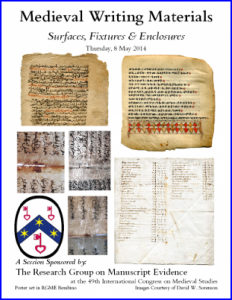
2014 Congress Medieval Writing Materials Poster
2016
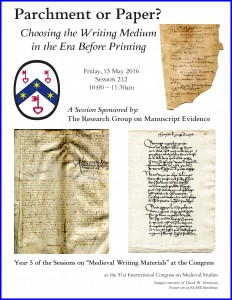
2016 Congress Poster
Coming soon: 2022.
*****
Watch this space. When the time is right, we will post the programs for the Sessions. Also the Abstracts for their Papers and Responses. Then the scheduling assignments, when they are ready for the 2022 Congress as a whole.
*****
